|
|
|
Sort Order |
|
|
|
Items / Page
|
|
|
|
|
|
|
| Srl | Item |
| 1 |
ID:
130814
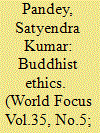

|
|
|
|
|
| Publication |
2014.
|
| Summary/Abstract |
Buddhist Ethics is imbedded in the fabric of Noble Eightfold Path which prescribes certain do's and don's in order to get rid of suffering and attain the highest goal of Eternal Bliss (Nirvana). Though, the basic purpose of Buddhism is to make the people aware of existential problem of suffering and to enable them to get rid of it, it has touched almost all aspect of human life. The formulation of Buddhist ethics in fom1 of moral code is one of them.
Ethics generally deals with human conduct and is concerned with questions pertain to what is good and bad, what is right and wrong, what is virtue and vice, what is just and unjust, what are our duties and rights. There are divergent views with regard to the scope and nature of ethics. Modern ethical philosophers belonging to the Analytic school of philosophy consider it their task merely to analyses and clayey the nature of ethical concepts or theories. For them, ethics constitutes a purely theoretical study of moral phenomena. They do not consider it their province to lay down codes of conduct, which they deem to be the function ofa moral teacher, a religious leader or a prophet.' However, some of the Existentialists philosophers consider it the duty of philosopher to recommend ways of life or modes of conduct which they consider desirable for the purpose of achieving some end which they regard as valuable. Kierkegaard, for instance, considers that there are three stages of life, namely, the aesthetical or sensualist, the ethical and the _religious. He indirectly recommends in his philosophy that we pass from one state to another. The aesthetical or sensualist way of life. according to him, leads to boredom, melancholy and despair, so it needs to be trans?gured in the ethical stage. and so on? When we peruse the Buddhist Ethics in this background, we see that it has an analytical study of ethical concepts and theories as well as positive recommendations to lead a way of life-' for attainment of the highest good, the supreme eternal bliss (nirvana) as well as the realization of ultimate truth
|
|
|
|
|
|
|
|
|
|
|
|
|
|
|
|
| 2 |
ID:
123406
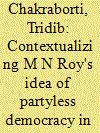

|
|
|
|
|
| Publication |
2013.
|
| Summary/Abstract |
Narendra Nath Bhattacharya (1887) and in later years known as Manabendra Nath Roy (M.N. Roy) adorns a remarkable place in the history of Indian philosophy of the twentieth century. He was a versatile scholar, a linguist, a born revolutionary, a subtle theorist, a penetrating intellectual, an uncompromising rationalist and an original thinker. Unlike the other Indian political thinkers of India, Roy has made a clear distinction between philosophy and religion in his thought. Roy's intellectual odyssey took him from militant Hindu nationalism to communism and there from to emerging as a humanist and radical democrat.
|
|
|
|
|
|
|
|
|
|
|
|
|
|
|
|
| 3 |
ID:
117089
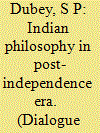

|
|
|
| 4 |
ID:
162401
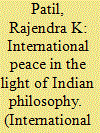

|
|
|
| 5 |
ID:
133570
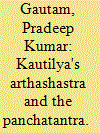

|
|
|
|
|
| Publication |
2014.
|
| Summary/Abstract |
Compares the Arthashastra and the Panchatantra and shows how these literary traditions radiated from India and have survived into modern times. He also analyses some of their moral aspects at various levels-from the individual to the state-manifesting the dualistic strand in Indian philosophy.
|
|
|
|
|
|
|
|
|
|
|
|
|
|
|
|
| 6 |
ID:
124467
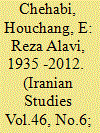

|
|
|
|
|
| Publication |
2013.
|
| Summary/Abstract |
Reza Alavi Shooshtari was born in Ahvaz on 7 September 1935. After attending Alborz High School for three years-an experience he did not enjoy because he found the school's ethos too authoritarian-he left Iran in 1950 for the United States and completed his secondary education at the Gilman School in Baltimore, Maryland. He entered Harvard College upon graduation in 1953. A resident of Leverett House, he graduated in 1957 with a concentration in History. Upon his return to Iran in the same year, he studied Persian literature in the traditional manner at Tehran's Sepahsalar Madrasa. In 1959 he went up to Oxford and, as a senior undergraduate at St. Antony's College, read Sanskrit under Thomas Burrow, the Boden Professor of Sanskrit, and R.C. Zaehner, the Spalding Professor of Eastern Religions and Ethics. He held a deep interest in early Buddhism and Upanishadic philosophy, and in the summer of 1960 first visited India to spend some time at an ashram so as to immerse himself practically in Indian philosophy. He received his second BA in Oriental Studies from the University of Oxford in 1962. While at St. Antony's, he also collaborated with Albert Hourani on organizing seminars on Persian literature and history at that college's recently established Middle East Centre. Encouraged by Hourani and Zaehner, he decided to pursue a doctorate at Oxford, for which he was awarded one of the prestigious Boden Scholarships to study Sanskrit and Pali.
|
|
|
|
|
|
|
|
|
|
|
|
|
|
|
|
| 7 |
ID:
143005
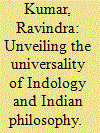

|
|
|
|
|
| Publication |
Meerut, World Peace Movement Trust, 2015.
|
| Description |
300p.pbk
|
| Standard Number |
9788192007786
|
|
|
|
|
|
|
|
|
|
|
|
Copies: C:1/I:0,R:0,Q:0
Circulation
| Accession# | Call# | Current Location | Status | Policy | Location |
| 058422 | 303.482001/KUM 058422 | Main | On Shelf | General | |
|
|
|
|
| 8 |
ID:
116279
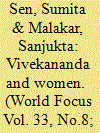

|
|
|
|
|
|
|
|